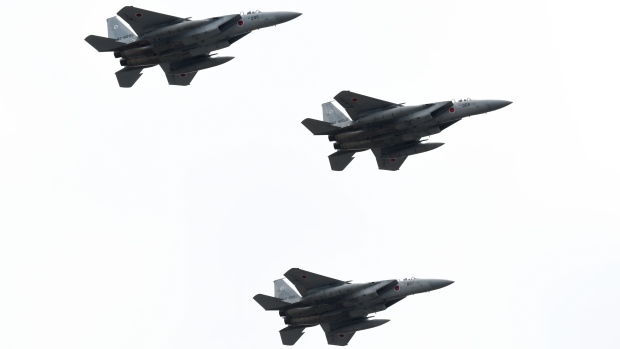Mar 15, 2024
Japan’s Ruling Parties Approve Exports of New Fighter Jet
, Bloomberg News

(Bloomberg) -- Japan’s ruling parties agreed to allow exports of a next-generation fighter jet the country is developing with two European partners, a coalition lawmaker said, further easing Tokyo’s restrictions on selling weapons abroad.
The agreement is expected to position Tokyo better for negotiations on dividing up work on the aircraft that it is developing with the UK and Italy and to help cut per-unit costs. The private companies involved in the project are set to establish a commercial framework this month.
The new export rule only applies to the new fighter jet and sales will be restricted to nations that are not at war and that have a defense equipment transfer agreement with Japan, according to documents distributed to reporters Friday. A cabinet decision will be required to approve each individual export case.
Those limitations were added to find a middle ground between the ruling Liberal Democratic Party and its junior coalition partner Komeito. Opposition from Buddhist-backed Komeito had delayed the agreement beyond the end of February deadline originally set by Prime Minister Fumio Kishida. Komeito policy chief Yosuke Takagi announced the decision.
The new jet is part of Kishida’s efforts to bolster Japan’s defenses amid rising concern over threats from the likes of China and North Korea. The premier, whose support has slumped due to a slush fund scandal, has yet to introduce tax hikes to finance the military expansion in the longer term.
Read more: UK, Italy and Japan Sign Treaty Formalizing Jet Fighter Plan
Japan, where pacifist sentiment has remained strong since the country’s World War II defeat, has been gradually easing its virtual ban on arms exports. In December, it decided to allow sales of weapons produced under license back to the country of origin, enabling Japan to export Patriot missiles to the US. In the same month, Japan signed a treaty with the UK and Italy to develop the fighter jet, known as the Global Combat Air Program.
The three main contractors are Mitsubishi Heavy Industries, London-based BAe Systems Plc and Italy’s Leonardo SpA. They aim to reach the development phase by 2025 and have the aircraft in service by 2035.
A survey conducted by public broadcaster NHK in March found 54% of respondents approved of exports of the plane with restrictions, while 32% said exports shouldn’t be allowed.
©2024 Bloomberg L.P.








